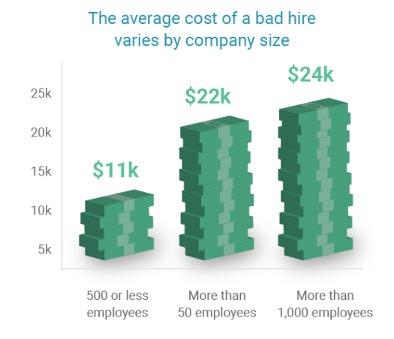When it comes to recruitment, some employers still typically rely on just the resumé of the candidate. Although this is not a bad thing, there’s only so much a resumé can give. According to Workonics data, 60% of recruiters judge candidates based on their personality traits, social skills, and emotional intelligence. These are things you don’t typically get from a resumé.
And then there’s the issue of the resumés being made by the candidates themselves, which means the documents are basically “sanitized” biographies if you will. You can’t blame the applicants. When a person is looking for a job, it’s but natural to “put one’s best foot forward.”
So how else can recruiters get a complete picture of the candidate then? Answer? Through data enrichment. In this article, we’ll look at the specific ways that help. But first, let’s look at what exactly data enrichment is.
What is Data Enrichment?
Data enrichment refers to all the “processes used to enhance, refine or otherwise improve raw data.” Simply put, it covers the following processes:
- supplementing missing or incomplete data
- correcting existing data
- organizing data
So when you enrich existing data about a candidate, you basically improve the information you have about him or her so you can make an informed decision. Ultimately, you want a decision that redounds to the benefit of the company (more on this later).
So for example, to supplement your existing data from the candidate’s resumé, you can maybe look for online sources that provide you with additional information about the applicant. As you will see later on, you can enrich your data manually or in an automated manner.
5 Ways Data Enrichment Can Help
So we know data enrichment is important. But how exactly does it help? Let’s look at five ways:
1. It Helps Employers Make an Informed Decision
I did mention that resumés can only give employers a glimpse of the “good” side of an applicant. That’s not precisely a good thing for employers, especially if you’re looking to fill a very important position in the company. If you’re hiring, you want that person who has the skills and perfect attitude for the job. You don’t want a bad hire, as this can cost you money. The average cost of a bad hire varies according to company size:

Data enrichment in the recruitment process isn’t actually a new thing. In 2017, 70 percent of employers already checked social media to screen candidates before hiring. This is significantly up from the 60 percent recorded the year before and the 11 percent in 2006.
The same survey said that employers who use social media typically look for the following information:
- The candidate’s qualifications for the job – 61 percent
- The candidate’s professional online persona – 50 percent
- People’s opinions about the candidate – 37 percent
- Reasons not to hire the candidate – 24 percent
Apart from social media, 69 percent of employers are also using online search engines such as Google, Yahoo, and Bing to research candidates, up from 59 percent in 2016.
The bottom line is, when you enrich your existing data about a candidate, you can generate a more complete view of how he or she is as a person, and generate accurate opinions about the candidate’s suitability (or unsuitability) for the job. You remove your own biases, and as a result, can make the best hiring decision about whom to hire.
2. It Helps Cut Short the Recruitment Process
During the job interview, you should have been able to generate enough information about your candidate so you can make an assessment about his or her suitability (or unsuitability) for the job. A typical job interview lasts between 45 minutes to one hour. If the employer has many questions, that can last even longer. This can have an impact on the recruiter’s daily work schedules and can delay the hiring process as managers spend more time at each stage.
With data enrichment, you can cut short that job interview time, and increase your productivity in other things.
If, for instance, you had enhanced data on a candidate’s work aspirations (maybe a public social media post), you wouldn’t have to ask your candidate how he or she sees himself or herself in five years during the interview. That could probably save you a good five minutes of your time. If you already had the answers to five other given questions during the interview, then you would have saved 25 minutes, assuming a candidate would take five minutes to answer each question.
Even a limited background check, which takes between three days to one week, barring hitches, can be cut short if you use data enrichment providers to automate certain aspects of the process (more on this later).
3. It Increases Your Hiring Conversion Rate
Data enrichment also helps improve your communication strategies as an employer.
When you have a glimpse of what your ideal candidates’ preferences are, you can create offers that align specifically with their professional goals. For instance, if you find out one of your A-list candidates prefers a flexible working arrangement, you can leverage your flexible work hours for employees to woo him or her into accepting your job offer. If your candidate has strong environmental advocacy, you can leverage the company’s strong environmental policies and its “clean and green” corporate social responsibility programs.
Data enrichment gives you the opportunity to employ a personalized approach to candidates so the chances of them choosing you as an employer increase. After all, employers need to “value employees’ whole selves and individuality.”
4. It Ensures Targeted Recruitment Marketing Campaigns
Data enrichment ensures that you have targeted recruitment marketing campaigns.
Let’s say you managed to gather information on individuals who have signed up in your company booth in a recruitment fair. With data enrichment, you can organize the data according to their interests, and then create specific recruitment marketing messages to be more effective.
If any of those on your list express an interest in sports, you can leverage your company’s sports development programs to attract them into applying for a job in your company. You can then create specific recruitment marketing messages for those who prioritize cultural diversity. For them, you can highlight the cultural diversity in your workplace.
The bottom line is, the better and the more accurately you understand your audience, the more tailor-fit your recruitment marketing messages will be.
5. It Prevents Data Decay
Business decisions, including those involving recruitment, are based in large part on data. When hiring is data-driven, the quality of hiring increases. HR teams who use data are also more likely to be efficient and reduce costs.
This is why there should be no room for data decay in the company. Data decay is the gradual loss of data quality within a system due to processes, systems, and a number of human factors.
Let’s look at an example. If for instance, a waitlisted A-list candidate suddenly changes his or her phone number, there’s no way the company can contact him or her when an important job position suddenly becomes vacant. Because of the data decay, the company ends up losing the opportunity to hire a very qualified candidate.
With data enrichment preventing data decay, you can keep the lines between you and qualified candidates open.
Sources of Data Enrichment
Now that you know what the benefits of data enrichment are, the next step would be to know how to enrich data in the first place.
You can do this in two ways: manually or in an automated manner. If you choose the first, that’s what you call a manual lookup.
With a manual lookup, you basically, by hand, “fetch” the necessary data. So for instance, you yourself can check out the social media sites of your candidate and make your own list of his or her interests and other information. You can use Google, too, and other online sites such as his or her blog, among others, to search for the relevant information.
If you want to save time, you can outsource the manual lookup to third-party providers.
If you choose the automated way, you can pick between web scraping and data enrichment providers.
Web scraping is basically the process of extracting data from websites with artificial intelligence called the web crawler and the scraper. The crawler basically browses the internet to index and search for content by following links and exploring. The scraper extracts the relevant information from the online sites.
You can hire a third-party provider to develop the scraper that is tailor-fit for a specific project.
Enrichment providers, on the other hand, are software solutions that can fetch the data that you need, and organize and cleanse it in a manner that’s useful for you. Email finders, for instance, can enrich your email list with additional data points such as companies of potential candidates, their locations, social media profiles, and job roles or you can use resume data extraction software to make the hiring process easy.
Conclusion
There’s no denying good data is crucial to the success of any business. The importance of good data in recruitment, in particular, cannot be overstated. It can, after all, determine the success of the company’s recruitment marketing campaign. More importantly, it can spell the difference between a good hire and a bad hire.
But what exactly is good data? Data is only good if it is continuously enhanced, and does not remain stagnant. Good data is updated. It is organized.
Bottom line is this. Good data is the result of data enrichment. And if businesses want to recruit the best of the best, they had better join the bandwagon the soonest possible time.
Bio
Owen Jones is the Senior Content Marketer at ZoomShift, an online schedule maker app. He is an experienced SaaS marketer, specializing in content marketing, CRO, and FB advertising. He likes to share his knowledge with others to help them increase results.





Comments (1)
Thank you for sharing this blog it’s really informative and helpful. I appreciate the effort that has been taken to write this blog for us. Please keep sharing.